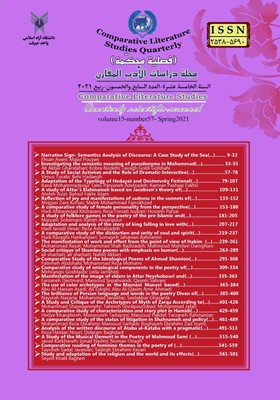Adaptation and analysis of the story of king falling in love with a maid from the perspective of the principles of governance in Masnavi Manavi
Subject Areas : شعرHadi Javadi Hesar 1 , Reza Ashrafzadeh 2
1 - PhD student in Persian language and literature, Islamic Azad University, Mashhad Branch
2 - Full Professor and Faculty Member of Islamic Azad University, Mashhad Branch, Department of Persian Language and Literature
Keywords: مثنوی معنوی, مولوی, Masnavi Manavi, پادشاه و کنیزک, Movlavi, مبانی حکومت داری, King and Maid, Principles of Governance,
Abstract :
The truth of criticism, or the chain of our condition, is the most important characteristic of knowing how to live. The precise influence and deep thought of people like Movlavi, in order to set the right goals, both in individual and social focus causes the most accurate stories in the form of "Masnavi". One of the centers of gravity of "Masnavi Manavi" is the story of the king and the maid, whose critique of the truth creates highways that the more we understand its depth, the more our inability to face it and the darkness in front of our eyes. Many descriptions of this story show the power of meanings and the resurrection of words that are poured in the form of order, and each thinker shapes it in a way based on the taste and talent of his critics and how artistically the ideas become Movlavi's companions. In this research, our different view targets the original principles of governance, and if we look at it fairly, we will realize that it is novel and different.
کتابنامه
مولوی، جلال الدین محمد. 1389ش، مثنوی معنوی، تصحیح نیکلسون، به کوشش کریم زمانی، چاپ پنجم، تهران: انتشارات نامک.
نصرالله منشی، ابوالمعالی. 1391ش، کلیله و دمنه، چاپ اول، تهران: انتشارات آدینه سبز.
_||_Bibliography
Movlavi, Jalaluddin Mohammad. 2010, Masnavi Manavi, edited by Nicholson, by Karim Zamani, fifth edition, Tehran: Namak Publications.
Nasrullah Monshi, Abu al-Ma'ali. 2012, Kelileh and Demneh, first edition, Tehran: Adineh Sabz Publications.


